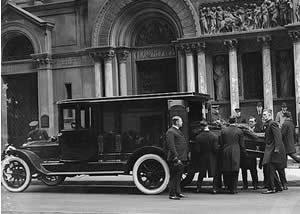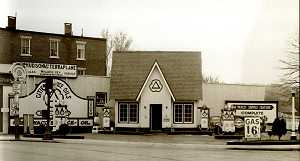 January 28 -- Over the last few days, four former commanders of the Islamic Revolutionary Guard Corps passed away without the usual condolences to their families from Ayatollah Ali Khamenei. Moreover, Guard chief Major General Mohammad Ali Jafari and former IRGC chief Major General Yahya Rahim-Safavi, now senior military adviser to Khamenei, did not bother to attend their colleagues' memorials either.
January 28 -- Over the last few days, four former commanders of the Islamic Revolutionary Guard Corps passed away without the usual condolences to their families from Ayatollah Ali Khamenei. Moreover, Guard chief Major General Mohammad Ali Jafari and former IRGC chief Major General Yahya Rahim-Safavi, now senior military adviser to Khamenei, did not bother to attend their colleagues' memorials either.It didn't go unnoticed, however, that Khamenei then conveyed his condolences to Ali Fadavi, commander of the IRGC naval forces, whose father recently died.
The four who had apparently fallen from the good graces of the Supreme Leader were Mansoor Torkan, Dr. Vafa Ghaffarian, Ahmad Sayyafzadeh, and Abbas Mohri.
Torkan, 50, chief operating officer of Yadman-e Sazeh Company, affiliated with the Tehran municipality, died on January 20 of an apparent stroke. He and his brothers fought in the Iran-Iraq War in the 1980s. Two were killed in combat. Another brother, Akbar Torkan, has served in several administrations since the 1979 Revolution.
Ghaffarian, 52, board chairman of the Telecommunications Company of Iran, passed away on January 21. After graduating with a degree in electronics, Ghaffarian joined the IRGC and played an important role in its electronic warfare during the war with Iraq. He was also deputy minister of defense for research and development in 2004-5, and also taught at Malek-e Ashtar University which is controlled by the IRGC, after receiving a Ph.D. in industrial engineering.
Sayyafzadeh, 55, a senior IRGC commander during the war, died on January 23. During the war, he was the operational commander of the IRGC in Ahvaz, the provincial capital of Khuzestan, which is in southwest Iran, and later the operational commander of the IRGC in Khuzestan. He was also in charge of planning and operation of the Najaf and Karbala military bases. He took part in some of the most important operations during the war, and was injured repeatedly during the war, particularly as a result of Iraq using chemical bombs and ammunition.
Mohri, 52, a senior IRGC commander during the war, died on January 24. No cause of death was given. At the time of his death, Mohri was deputy Dean of Faculty of Culture in Emam Hossein University, where many hardliners have studied and received their degrees.
Hossein Alaei, the first commander of the IRGC naval forces, who wrote a scathing article in Ettela'at newspaper two weeks ago implicitly criticizing Ayatollah Ali Khamenei, paid tribute to Sayyafzadeh. "He participated in all the important operations against the dictatorial regime of Saddam Hossein," he wrote. After his controversial article in Ettela'at angered the hardliners, including 12 IRGC commanders, Alaei published another article, this time in Jomhoori Eslami newspaper, emphasizing once again that "all dictators will be toppled." He also said he wondered whether "we will witness the overthrow of another dictator by next February [of 2013]." A group of families of IRGC officers and commanders who have been killed in the past, have written a letter to Alaei, declaring their support for him.
Sayyafzadeh and Mohri were very important IRGC commanders during the war. Former President Akbar Hashemi Rafsanjani did send his condolences to the families of the two men.
Over the past 15 months, four other IRGC commanders, past and present, have also died. In April 2011, three IRGC officers, including Colonel Seyyed Ali Shadmehr, who was an IRGC commander during the war with Iraq, were killed in a car crash.
Earlier, in November 2010, Brigadier General Seyyed Mohammad Ali Mousavi Shushtari, 47, deputy commander of the IRGC ground forces for intelligence, passed away. ISNA, the Iranian Students News Agency, reported that he had been ill, but did not specify the cause of his death.
On January 9, 2009, an aircraft carrying 11 IRGC officers crashed and killed all of them: eight brigadier generals, one lieutenant brigadier general, and one colonel. The senior IRGC commanders among them included Brigadier General Ahmad Kazemi [he was promoted to Major General posthumously]; commander of the IRGC ground forces and deputy chief of the IRGC; Brigadier General Saeed Moatamedi, commander of the mechanized Mohammad Rasoolallah Division; and Brigadier General Saeed Soleimani, deputy commander of the IRGC ground forces for operations.
Kazemi was a very important IRGC commander during the war with Iraq, and his death sparked intense speculations. The air crash was shrouded in secrecy. Brigadier General Yahya Rahim-Safavi, IRGC chief at that time, said that the cause of the crash was "an explosion inside the aircraft," but did not divulge more details. Earlier, the IRGC said that the crash had been caused by "mechanical problems." Rahim-Safavi never mentioned the explosion ever again.


 TEHRAN (Reuters) - Iran will next week grant Total, Shell and Repsol upstream development contracts in the giant South Pars gas field in the Gulf, an Iranian state oil firm said on Saturday.
TEHRAN (Reuters) - Iran will next week grant Total, Shell and Repsol upstream development contracts in the giant South Pars gas field in the Gulf, an Iranian state oil firm said on Saturday.